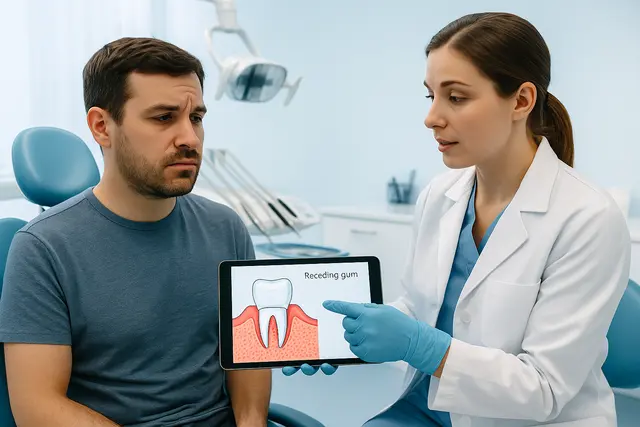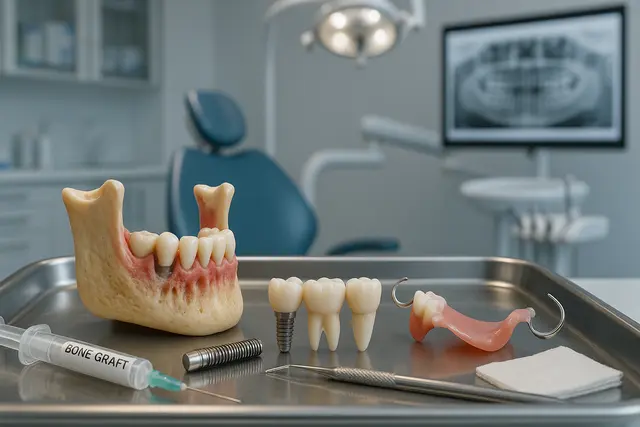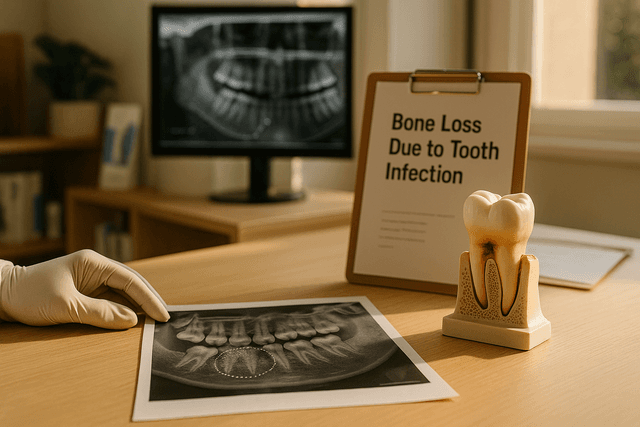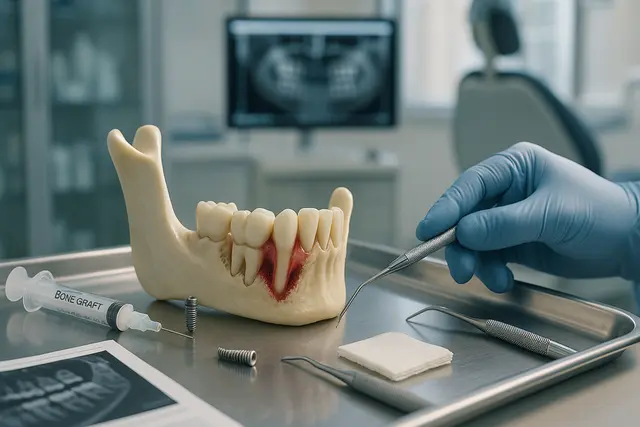Oral Health
5 min read
Jul 09, 2025
Gums Receding Around Crown? Causes, Fixes, and What to Do Next
Noticed your gum pulling away from a dental crown? You’re not imagining it, and you’re definitely not the only one. Receding gums around a crown can be a red flag for bigger dental issues, from gum disease to a poorly fitted crown. Before you panic or start Googling worst-case scenarios, let’s walk through what’s really going on, why it happens, and what you can do to fix it, without losing your smile (or your mind).

You’re brushing your teeth one morning, just doing your thing, when you catch a glimpse of something unsettling in the mirror: the gum around your dental crown seems to be shrinking away, revealing more tooth than you remember. Maybe it looks a little darker. Maybe there’s even a strange line around it. And suddenly you’re Googling “gums receding around crown” faster than your toothbrush can shut off. Sound familiar?
You're not alone, and you’re not out of options. Let’s break it all down: what causes this gum recession, why it matters, and how you (and your dentist) can fix it.
Why Your Gum Might Recede Around a Dental Crown
First off, let’s clear one thing up: a receding gum line around a crown isn’t always the crown’s fault. That gum tissue has a lot going on. It reacts to pressure, bacteria, habits like grinding your teeth, and even just time doing its thing.
The most common reason gums recede is gum disease, yes, even around your crown. If bacteria hang out too long on your teeth and gums (thank you, plaque), they can spark inflammation. Left unchecked, that can become periodontal disease, which slowly eats away at the gum and bone that hold your teeth in place. That includes the tissue around a crown.
An ill-fitting crown may also be to blame. If it doesn’t sit snugly at the gum line or traps plaque beneath the crown, irritation can lead to recession. This is especially true if you notice a black line around the crown or along the gum line. This could be from older metal crowns or poor crown placement that exposes the underlying tooth.
Sometimes, your crown is simply getting old. Dental crowns last, on average, 10–15 years, but that lifespan can vary depending on your oral hygiene, daily wear and tear, and whether you grind your teeth. A crown is tough, but it’s not invincible.
Common Dental Crown Problems That Cause Gum Recession
So what exactly can cause gum recession around a crown? Let’s get specific.
Teeth grinding or TMJ: The constant pressure can stress the crowned tooth and surrounding gum tissue.
Poor oral hygiene: If you’re skipping flossing or brushing poorly around your crown, bacteria can thrive. Receding gums love a plaque party.
Old or broken crowns: If your crown is old or cracked, it might not seal the tooth properly. That leaves the underlying tooth exposed to decay and causes the gum to pull back.
Black line around the crown: Porcelain fused to metal crowns often develop a dark line where the metal peeks out at the gum line. This doesn’t just look odd; it might also irritate the surrounding gum tissue.
Bad fit: A crown that doesn’t match your bite or contours correctly with your natural teeth can stress the tissue around it every time you chew.
Even the most skilled dentistry can’t always stop gums from receding if the crown is outdated or you’re brushing like you’re scrubbing a frying pan.
Keeping Gum and Dental Hygiene Front and Center
Let’s talk about hygiene because it matters. Whether you’ve had your crown for years or just got a shiny new dental crown, keeping your gums clean is key to protecting your crown and the tooth beneath it.
Brush your teeth at least twice a day, but ditch the death grip. Use a soft-bristle toothbrush and gentle strokes. Scrubbing like a maniac won’t encourage your gum to grow back; it’ll just wear it down more. And don’t forget to floss around the crown. Yes, even around your crown. Plaque sneaks in everywhere.
If your crowned tooth feels sensitive to hot and cold, that’s often a warning that the gum has receded far enough to expose the tooth root or the edge of the crown. Not ideal.
For a full cleaning and checkup, your best bet is always a dentist. They can spot early gum recession, check for decay beneath the crown, and catch subtle signs of inflammation you won’t see on your own.
The Fix: What to Do When Gums Recede Around a Crown
So, what now? You’ve got a receding gum line, a crowned tooth, and maybe even some sensitivity. Here’s what you can expect your dentist to suggest:
Gum grafting: If the gum loss is significant, a gum graft may be needed to rebuild tissue around a crown.
Replace your crown: If the crown is old, damaged, or never fit well to begin with, a new crown might be the best solution.
Treat the underlying cause: If gum disease or poor oral hygiene triggered the issue, your dentist might recommend a deep cleaning, antibiotics, or changes to your routine.
Monitor for tooth decay: When gums recede, the root of the tooth becomes more exposed, and that means a greater risk of decay.
Dental implants: In worst-case scenarios, where the damage to the underlying tooth is too severe, a dental implant might be necessary.
If you’re noticing a dark line, sensitivity around the tooth, or changes in how the crown feels when you bite, don’t wait; schedule an appointment.
When a New Dental Crown Is the Right Move
Maybe your crown is old, doesn’t fit anymore, or simply looks out of place compared to your natural tooth color. Getting a new crown can improve both your smile and your gum’s health.
Today’s crowns are better than ever. Crowns are made from porcelain or other tooth-colored materials that blend in with your natural teeth. A properly fitted crown protects teeth, matches the gum line well, and won’t leave that annoying black line around the crown. And no, your gums may not magically regenerate, but with good dental care and better crown placement, you can stop the recession from getting worse.
Sometimes, recession is gum disease-related. Other times, it’s about wear and tear. Either way, a new dental crown done by a skilled dentist can make a world of difference.
Receding Gums Need Attention Now
Receding gums aren’t just a cosmetic issue; they can lead to tooth loss, sensitivity, and serious dental problems if left unchecked. The good news? You’re not stuck with it.
With the right dental hygiene, regular dental visits, and quick action when something feels off, you can protect your teeth and gums for the long haul. Whether your crown needs a small adjustment or a total makeover, your dentist has tools to help restore your gum tissue, improve fit, and give your oral health the support it deserves.
So if your gums are starting to recede around a crown, take it as a sign. It’s time to give your dentist a call, your floss a second chance, and your crown the attention it needs. Your smile (and your gums) will thank you.
What Causes Gums to Recede Around a Dental Crown?
Gum recession around a dental crown can result from several factors, including gum disease, poor oral hygiene, teeth grinding, or an ill-fitting crown. Bacteria and plaque buildup are major culprits, but even brushing too aggressively or wearing an old crown can irritate the gum tissue and lead to recession.
Is a Dark Line Around My Crown a Sign of Gum Recession?
Yes, a dark line at the gum line, especially around porcelain-fused-to-metal crowns, can indicate gum recession or an aging crown. This line may be where the metal base of the crown is exposed due to gum shrinkage, which can also trap bacteria and further irritate the gums.
Can Receding Gums Around a Crown Be Fixed?
Yes, treatment depends on the cause and severity. Solutions may include gum grafting to restore lost tissue, replacing a poorly fitted or aging crown, or treating gum disease through professional cleaning and improved hygiene. Your dentist will assess the condition and recommend the best approach.
How Can I Prevent Gum Recession Around My Crown?
To prevent gum recession, practice gentle but thorough oral hygiene using a soft-bristle toothbrush and daily flossing, especially around crowns. Regular dental checkups help catch early signs of recession or crown issues. Avoid grinding your teeth, and address any crown discomfort promptly.
Read Next
Related Posts

Oral Health
Tooth Replacement Options to Prevent Bone Loss
Losing a tooth isn’t just about appearance, it can have a lasting impact on your oral health, jawbone strength, and overall quality of life. When teeth go missing, the jawbone begins to shrink, which can change your bite, your facial structure, and even your confidence. Fortunately, modern dentistry offers several effective solutions to replace missing teeth and prevent further bone loss.
4 min read
Sep 26, 2025

Oral Health
Bone Loss Due to Tooth Infection Explained: What It Means for Your Oral Health
A tooth infection isn’t just about pain, it can quietly damage the tissues around a tooth and even erode the jawbone that supports your smile. This guide explains how infections start, why they can lead to bone loss, the warning signs to watch for, and the treatments that can stop the spread and rebuild lost support.
5 min read
Sep 25, 2025

Oral Health
Understanding Bone Loss in Teeth: Causes and Treatments That Work
Bone loss in teeth is a silent threat that can compromise your smile, facial structure, and overall oral health. While it often goes unnoticed in the early stages, it can lead to serious consequences if left untreated. Understanding what causes dental bone loss, and how to prevent or manage it, is key to maintaining a strong, healthy foundation for your teeth.
5 min read
Sep 25, 2025
Don’t have time to research every dentist around you?
See why 30k+ patients trusted us